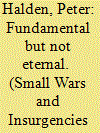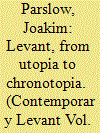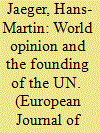|
|
|
Sort Order |
|
|
|
Items / Page
|
|
|
|
|
|
|
| Srl | Item |
| 1 |
ID:
120305


|
|
|
|
|
| Publication |
2013.
|
| Summary/Abstract |
Although the public-private distinction is a historical construction it has been deeply internalized and taken for granted in Western ways of thinking about society and politics. Therefore, we often apply it uncritically as a way to categorizing and coding non-Western societies. Doing so unreflectively may distort our observations as well as policies of state- and peacebuilding. I outline the history of the public-private distinction by emphasizing its role in state-formation processes. This distinction was essential to the formation of the state and society as distinct categories. Indeed, it was and is a pre-condition of the autonomy of the state.
|
|
|
|
|
|
|
|
|
|
|
|
|
|
|
|
| 2 |
ID:
172374


|
|
|
|
|
| Summary/Abstract |
This essay responds to this special issue’s challenge of thinking the Levant through Bakhtin’s notion of the chronotope, with a theoretical reflection on the potentials and limitations of chronotopic thought in social and historical scholarship. The essay is structured around two questions. First, given the overwhelmingly literary associations with which we tend to approach Bakhtin’s thought today, is the chronotope a tool for literary analysis only, or is it applicable to other forms of communication, cognition, and action? Second, what implications does chronotopic analysis have for scholarship that seeks methods of analysing and writing about the Levant in a historically and politically responsive way? Should chronotopes always be understood as the a priori horizon of meaningful narration, as frameworks that make certain plots, events, interpretations, and actions possible while precluding others, or are they also an observable and manipulatable aspect of communication, one that can be subject to the quotidian equivalent of authorial intention, creative reception, and political contestation? Placing the chronotope in the context of Bakhtin’s earlier philosophical project, I argue that although the chronotope facilitates the reflexivity and subversiveness which Bakhtin sees as defining and ethically necessary achievements of modern discourse, these characteristics are both self-limiting and morally ambiguous.
|
|
|
|
|
|
|
|
|
|
|
|
|
|
|
|
| 3 |
ID:
178185


|
|
|
|
|
| Summary/Abstract |
The article analyzes the Svalbard Global Seed Vault (SGSV) as a specific security technology created to deal with the ecological threat of biodiversity loss. Built in 2008 inside the Arctic Circle, the SGSV serves as a backup for 1,700 agricultural gene banks around the world. If seed collections are lost due to natural disasters or human error, the gene banks can request copies of their varieties from Svalbard and restore their collections to continue the endeavour of plant breeding. The article focuses on the particular temporal politics expressed in the SGSV. Drawing on Niklas Luhmann’s reflections on time, it is argued that the SGSV opens up the possibility of reversing events by expanding the duration of the present. By separating seeds from their ecological connections on the one hand and controlling their metabolic processes through the use of cold on the other, an enduring temporal zone is created that allows modern society to control the unpredictable and irreversible dynamics of life and undo its emergent effects. The SGSV therefore materializes what is herein called the politics of reversibility.
|
|
|
|
|
|
|
|
|
|
|
|
|
|
|
|
| 4 |
ID:
085398


|
|
|
|
|
| Publication |
2008.
|
| Summary/Abstract |
While `world opinion' is a staple in political discourse, the concept has received little attention in IR. Locating it along the `realist-idealist' divide, existing studies have conceptualized `world opinion' empirically, as an aggregative or intersubjective phenomenon, annexed or opposed to state sovereignty, and embodying a normative standard. Drawing on Luhmann's conception of public opinion and Foucault's governmentality approach, this article reconceptualizes `world opinion' discursively (functionally and semantically), as a medium of communication that enables post-sovereign forms of international governance irrespective of an inherent normativity.
|
|
|
|
|
|
|
|
|
|
|
|
|
|
|
|
|
|
|
|
|